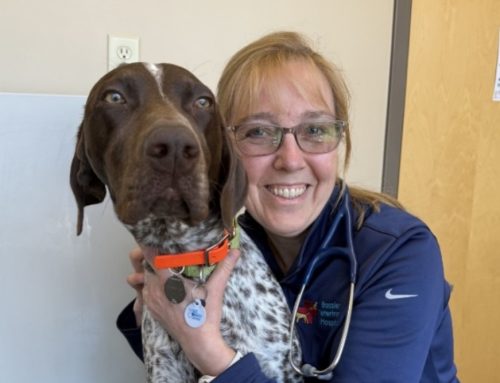As pets age, they experience many changes, some that may seem normal. Cognitive dysfunction is one such change. However, many pet owners fail to note a change in their pet’s mental ability because they believe a decrease is simply related to old age, and nothing can be done. But, many methods can keep your pet’s mind sharp. First, though, you must learn to recognize cognitive dysfunction in your furry pal.
Traditionally, the acronym DISHAA has been used to describe cognitive dysfunction signs, but veterinary behaviorists have since recognized additional signs. An updated list of signs associated with cognitive dysfunction in pets includes:
- Disorientation — Your pet may become easily confused with once-familiar activities, people, and surroundings, that manifests as:
- Getting lost in familiar areas
- Appearing confused
- Staring off into space or at walls
- Getting stuck in corners
- Getting trapped under or behind furniture
- Waiting at the wrong side for the door to be opened
- Interactions with people and pets — Pets with cognitive dysfunction may display unusual interactions, such as:
- Not recognizing family
- Seeking attention less
- Becoming withdrawn
- Interacting less with other household pets
- Becoming aggressive
- Losing enthusiasm for play
- Sleep-wake cycle changes — Often referred to as sundowner’s syndrome, your pet with cognitive dysfunction may:
- Sleep more during the day and less at night
- Wander restlessly at night
- Startle easily
- House soiling — Senior pets with cognitive issues often have problems with elimination, such as:
- Inappropriate elimination
- Forgetting how to “ask” to go outside
- Forgetting all prior house training
- Activity levels — While activity levels can drop with advancing age, cognitive dysfunction can manifest as:
- Less activity
- Restless behavior
- Repetitive behavior
- Anxiety — Pets with impaired mental function often become stressed and anxious, which may show as:
- Unusual or excessive vocalization
- Clingy behavior
- Fear of familiar objects, places, pets, or people
- Memory and learning — As your pet’s cognitive function fails, so do their memory and learning abilities. You may notice your pet:
- Forgetting trained behaviors
- Having difficulty learning new skills
- Not responding to their name
- Appetite changes — Appetite changes can indicate a great many health issues, but can also appear in pets with cognitive dysfunction, including:
- Appetite loss
- Forgetting where food and water bowls are located
- Difficulty aiming the mouth
As cognitive dysfunction affects every aspect of your pet’s life, keeping their mind sharp and functioning well into old age is critical. Including the following four methods in your daily routine can help keep your four-legged friend’s brain bright.
#1: Brush up on your pet’s obedience and trick repertoire
Nothing invigorates your pet’s mind more than learning new skills and practicing old tricks. Contrary to popular belief, you can teach an old dog new tricks—and old cats, too. Find a reward your pet loves and encourage them to spin in a circle, target your hand for a nose boop, or jump or step through a hoop. Your pet’s zest for performing tricks may not have diminished, but their endurance likely has, so stick to brief daily sessions to avoid tiring them out.
#2: Feed your pet from food puzzles instead of a bowl
If your senior pet spends their day waiting for you to fill their dish with their next meal, you’re not doing them any favors. Make your pet mentally and physically work for their meals by ditching the food dish and using food puzzles instead. Many commercial products can be purchased, or you can create your own by hiding kibble in crumpled paper in a box or a cardboard tube with small holes cut out. Or, try freezing overnight a rubber Kong filled with mixed canned and dry food, or fresh veggies, for longer lasting enjoyment.
#3: Encourage your pet to participate in social activities

Encourage your pet to socialize with the family or their favorite furry companions to prevent withdrawal. Regular outdoor activities can help keep your dog’s mind sharp, especially if they are playing with other dogs or people. For cats, invite familiar people to interact with them, to inject something new and exciting into their daily routine.
#4: Consult with your Bassler Veterinary Hospital team about cognitive support options for your pet
As your pet ages, their nutritional needs change to better support their brain, muscle, organ, and bone health. Similar to joint health supplements, a vast number of products are available to help boost your pet’s cognitive function as they age. Some of the most effective products proven to support mental health in pets include:
- Supplements — Not all supplements are created equal, so do your research before choosing a cognitive support product, or ask Dr. Bassler for specific recommendations for your pet. Beneficial ingredients include antioxidants to scavenge free radicals and prevent cellular damage, phospholipids to support cell membrane health and brain function, ginkgo biloba to decrease behavior changes, apoaequorin to combat neurotoxins, and fatty acids to boost overall brain health and function.
- Diets — As pets live longer, more over-the-counter and prescription diets are formulated for senior pets’ needs. Several diets are packed with ingredients proven to slow mental decline and support an aging brain, such as antioxidants, fatty acids, and medium-chain triglycerides.
- Medication — Although only one medication is approved for cognitive dysfunction in pets, it can make a difference in your senior pet’s life. Selegiline increases dopamine levels in the brain, which helps support cognitive function.
Cognitive dysfunction in pets has no cure, so the best management protocol is multimodal, implementing elements from each category to find what works best for your pet.
If your pet is suffering from a decline in cognitive function, don’t chalk it up to an inevitable part of aging. Instead, discuss cognitive support options with Dr. Bassler and her team to learn about the products that can best boost your pet’s mind. Contact Bassler Veterinary Hospital to schedule an appointment for your senior pet.








Leave A Comment